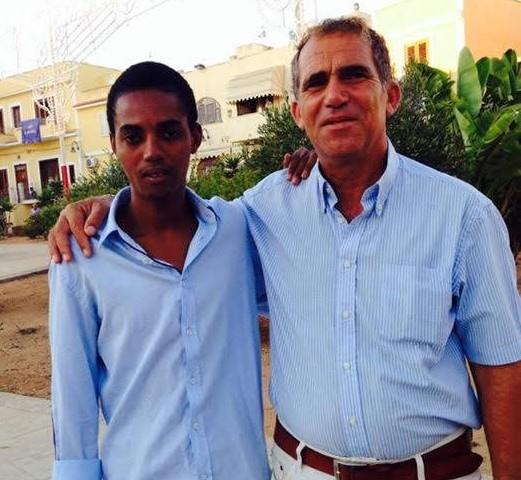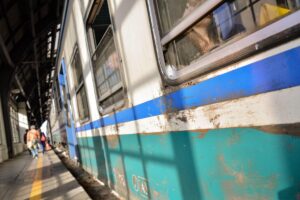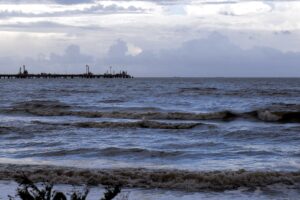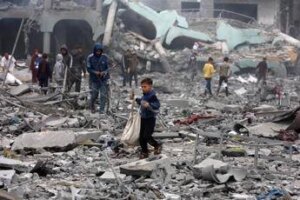La storia di Lillo e Seydou: “Il viaggio di mio figlio attraverso il mare”

Seydou from the sea is still afraid. “It’s a trauma he hasn’t been able to overcome. He doesn’t know how to swim, he never wanted to learn,” says his father Lillo. However, Seydou has crossed the sea. Alone, at 16 years old, just a child. On a cart that left from Libya, along with 100 other companions, he challenged the waves to reach Europe. “He is the male child who arrived from the sea. Trouble for anyone who touches him,” says Lillo Maggiore, a true Lampedusa resident, to Adnkronos.
Seydou arrived on the largest of the Pelagie Islands on January 10, 2014. He had been rescued by the “Mare Nostrum” mission and taken first to Augusta and then to Messina, to a community for minors. “I had taken a course on foster care with the association Ai.bi,” says Lillo. In the past, the Maggiore family had already opened the doors of their own home. They did so, for example, with Alex and Teame, both Eritrean and both having escaped death in the tragic shipwreck on October 3, 2013, in which 368 people lost their lives just a few miles off the coast of Lampedusa.
“That was the spark that led us to the desire to help a minor,” admits father Lillo. Alex and Teame stayed at their home for four months. Then came the departure. “It was like saying goodbye to two children. It was very painful.” However, that departure marked the beginning of a new life. “When Seydou arrived under foster care, it was a big celebration. My daughters welcomed him like a brother who came from afar and whom they hadn’t seen for a long time. An indescribable emotion, we cried and rejoiced together for that gift.”
At first, it wasn’t easy. “Seydou didn’t speak Italian, we had some difficulty understanding each other. But we immediately enrolled him in school, he had never been before. He quickly learned our language.” After six months, he received his middle school diploma and then a diploma from the hotel management institute. “He loved soccer, so we enrolled him in a sports association. We did what a normal family does for a child, giving him an outlet beyond studying,” says Lillo, an administrative assistant at the Luigi Pirandello Institute in Lampedusa.
Today, Seydou is 25 years old and works at a supermarket in Lampedusa. “A full-time permanent contract. He is happy and fully integrated. He lives with us, he is our son in every way,” says Lillo proudly. He left his family in Senegal. “He stays in touch with them, he is a point of reference for them. In fact, thanks to his work here, he is able to support them in Senegal.” He left his country to help them. “They were living in extreme poverty. They relied on him.” It was a difficult journey. “He crossed four countries to reach Libya and embark. He still fears the sea. It’s a trauma he has not overcome. He told us that when he boarded the rubber boat, the waves were high. ‘The boat was rocking, we were afraid of dying,’ he said.”
In recent days, when the small island in the middle of the Mediterranean became filled with migrants again – 112 landings in just 24 hours and over 7,000 people arrived – Lillo once again opened the doors of his home. And opened his heart. “We prepared food and helped a group of boys, they came from Burkina Faso and Gambia. They devoured the food. They were hungry. And while they ate, they never stopped thanking us.” Alex and Teame also returned to Lampedusa in these days. For four months, immediately after the tragic shipwreck on October 3, they found a ‘safe’ harbor in Lillo and his family. “That morning I met them on the street, still in shock and with tears in their eyes. Alex had lost his best friend. I brought them home, gave them food, and reassured them.” Since that day, both have returned to Lillo. “I gave them the keys to the house, they came in the morning and returned to the hotspot to sleep in the evening. We ate together, they knew our schedules. We were a real family.”
Last night, Alex and Teame were able to meet with father Lillo again. “We hugged and held each other tight, a great emotion, I couldn’t hold back the tears.” Today, both live abroad. “Alex in the Netherlands, he got married and has three children, Teame in Norway and has two children. They are our grandchildren,” Lillo smiles with the tenderness of a ‘grandfather’. Then his gaze becomes somber. “10 years after that tragic shipwreck, nothing has changed – he says -. Even today, we count the dead. People continue to die in the Mediterranean, one massacre after another. And yet, we continue to take the wrong path. Agreements with Tunisia and Libya? We cannot think of giving money to stop departures.”
“We must invest in the countries of origin, seek collaborations there to offer those who leave an alternative, a future – he emphasizes -. And to those who say that migrants steal jobs from our children, I say that these young people do jobs that we Italians refuse to do. If we find what we eat on our tables, we must say ‘thank you’ to them.” Lillo simply cannot imagine a life without Seydou. “For me, it’s unthinkable. He is my third child, the male child who came from the sea…” (by Rossana Lo Castro)










